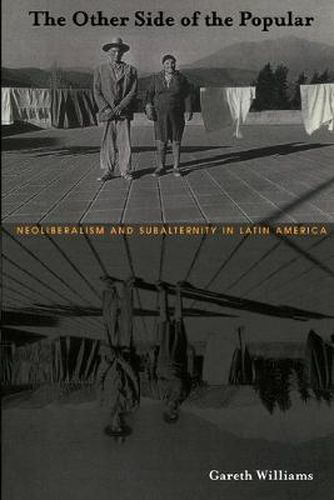Readings Newsletter
Become a Readings Member to make your shopping experience even easier.
Sign in or sign up for free!
You’re not far away from qualifying for FREE standard shipping within Australia
You’ve qualified for FREE standard shipping within Australia
The cart is loading…






Drawing on deconstruction, postcolonial theory, cultural studies, and subaltern studies, The Other Side of the Popular is as much a reflection on the limitations and possibilities for thinking about the politics of Latin American culture as it is a study of the culture itself. Gareth Williams pays particular attention to the close relationship between complex cultural shifts and the development of the neoliberal nation-state. The modern Latin American nation, he argues, was built upon the idea of the people, a citizenry with common interests transcending demographic and cultural differences. As nations have weakened in relation to the global economy, this moment-of the popular as the basis of nation-building-has passed, causing seismic shifts in the relationships between governments and cultural formations. Williams asserts that these changed relationships necessitate the rethinking of fundamental concepts such as the popular and the nation. He maintains that the perspective of subalternity is vital to this theoretical project because it demands the reimagining of the connections between critical reason and its objects of analysis. Williams develops his argument through studies of events highlighting Latin America’s uneasy, and often violent, transition to late capitalism over the past thirty years. He looks at the Chiapas rebellion in Mexico, genocide in El Salvador, the Sendero in Peru, Chile’s and Argentina’s transitions to democratic governments, and Latin Americans’ migration northward. Williams also reads film, photography, and literary works including Ricardo Piglia’s The Absent City and the statements of a young Salvadoran woman, the daughter of ex-guerrilleros, living in South Central Los Angeles. The Other Side of the Popular is an incisive interpretation of Latin American culture and politics over the last few decades as well as a thoughtful meditation on the state of Latin American cultural studies.
$9.00 standard shipping within Australia
FREE standard shipping within Australia for orders over $100.00
Express & International shipping calculated at checkout
Drawing on deconstruction, postcolonial theory, cultural studies, and subaltern studies, The Other Side of the Popular is as much a reflection on the limitations and possibilities for thinking about the politics of Latin American culture as it is a study of the culture itself. Gareth Williams pays particular attention to the close relationship between complex cultural shifts and the development of the neoliberal nation-state. The modern Latin American nation, he argues, was built upon the idea of the people, a citizenry with common interests transcending demographic and cultural differences. As nations have weakened in relation to the global economy, this moment-of the popular as the basis of nation-building-has passed, causing seismic shifts in the relationships between governments and cultural formations. Williams asserts that these changed relationships necessitate the rethinking of fundamental concepts such as the popular and the nation. He maintains that the perspective of subalternity is vital to this theoretical project because it demands the reimagining of the connections between critical reason and its objects of analysis. Williams develops his argument through studies of events highlighting Latin America’s uneasy, and often violent, transition to late capitalism over the past thirty years. He looks at the Chiapas rebellion in Mexico, genocide in El Salvador, the Sendero in Peru, Chile’s and Argentina’s transitions to democratic governments, and Latin Americans’ migration northward. Williams also reads film, photography, and literary works including Ricardo Piglia’s The Absent City and the statements of a young Salvadoran woman, the daughter of ex-guerrilleros, living in South Central Los Angeles. The Other Side of the Popular is an incisive interpretation of Latin American culture and politics over the last few decades as well as a thoughtful meditation on the state of Latin American cultural studies.